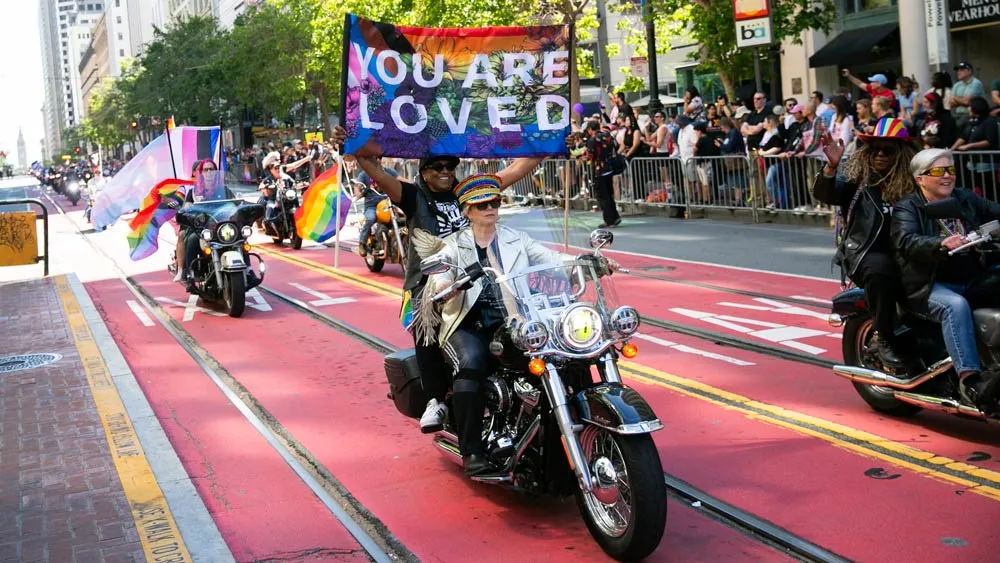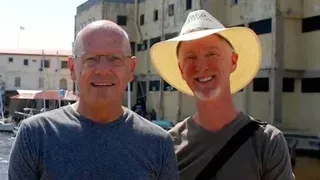September 9, 2017
Jai Rodriguez Encourages HIV+ Latinx Gay and Bisexual Men To Live Positively Fearless
Winnie McCroy READ TIME: 7 MIN.
HIV continues to have a profound impact on the Latinx community, despite overall progress in reducing HIV diagnoses in the U.S. and treatment advances. This is why Latino�actor and musician Jai Rodriguez and�patient advocate Adrian Altamirano are partnering with�Positively Fearless; to help the Latinx community take control of their own health.
Gay and bisexual Latinx men are one of the few groups in the U.S. for whom annual HIV diagnoses are continuing to increase, per a CDC report released earlier this year, and Latinx people living with HIV are less likely to be engaging in effective treatment. In fact, they're twice as likely to report missing a dose of their medication in the last 48 hours -- increasing the chance of treatment failure and the development of HIV medication resistance. If the current rates continue,�one in four�gay and bisexual Latinx men will be diagnosed with HIV in their lifetime (significantly higher than the one in 11 rate for Caucasians).
�
Rodriguez, best known for hosting the Emmy-winning reality show�"Queer Eye for the Straight Guy" and�patient advocate Adrian Altamirano, who works at Nashville's Street Works, are working to educate�and empower Latinx gay and bisexual men to be "positively fearless" in taking control of their health and overcoming the stigma that can keep them from getting tested for HIV, or seeking treatment after receiving a
Jai Rodriguez is an actor, musician and Broadway performer, got his start playing HIV-positive character, Angel, in the acclaimed Broadway musical�"RENT." Rodriguez currently stars in the recently-premiered Las Vegas rendition of "Sex Tips for Straight Women from a Gay Man," and the off-Broadway show�"Buyer and Cellar." In addition to his work as an entertainer, Rodriguez actively supports the HIV and LGBTQ communities as a regular at events for AIDS Walk, AIDS Project Los Angeles (APLA), Richmond/Ermet Aid Foundation (R.E.A.F.) and Life Group LA.
�
Adrian Altamirano thought the worst was over -- but shortly after losing his mother to cancer, 22-year-old Adrian was diagnosed with HIV. Feeling lost, Adrian desperately sought after someone who could understand what he was going through and was introduced to the world of peer-navigation. During his search, he also realized a strong need for information available in his native language, Spanish.
Altamirano was inspired to become a peer navigator himself and started a career at Street Works, an AIDS service organization in his current hometown of Nashville, Tennessee, where he helps individuals living with HIV/AIDS by navigating them into care and connecting them with the specialists they need.
He is passionate about providing HIV resources, in-language information, and education to his peers and community -- particularly helping those who are afraid to seek proper treatment find the courage to take control of their health. In addition to his current role at Street Works, has also worked as an HIV tester and counselor for those who have been newly diagnosed with HIV, and is now joining efforts on the national level as a spokesman for�Positively Fearless.
EDGE: Why is it important to battle the stigma around HIV to get people tested and into treatment?
Jai:�The stigma around being HIV-positive is contributing to the epidemic within the Latinx community. Fear of disclosing sexual orientation or multiple partners often prevents Latinx from seeking treatment or support from friends and family. If you aren't HIV-positive, you can help by creating a supportive environment where people living with HIV are comfortable being open with their status, and by encouraging them to work with their doctor to get on and stay on treatment so that we can reduce the impact of HIV in our community.
�
Adrian: Because the fear of stigma around HIV plays such a strong and detrimental role in our community, it's more important than ever that we come together because we are stronger together -- we need to speak up, support each other and take charge of our health. That's why I've joined forces with Janssen's�Positively Fearless�campaign.
�
EDGE: Why do you think gay and bisexual Latinx men are less likely to be engaging in effective treatment?
�
Adrian:�Fear of judgment, stigma or misinformation can lead many Latinx gay and bisexual men to avoid getting tested for HIV, or not seek treatment after receiving a positive diagnosis. It also can lead many people living with HIV to not take their medication as prescribed.
�
Jai:�What many don't understand is, Latino people are twice as likely to report missing a dose of their medication in the past 48 hours -- this could be due to stigma, socioeconomic issues or fear of judgment. This is a big issue because missing doses of HIV drugs can cause HIV medication resistance.
If your body becomes resistant to a certain medication, you could have fewer treatment options to manage HIV. One of the most important things you can do to reduce your risk for resistance is to stay 100 percent adherent -- this means you need to take your medication as your doctor prescribes, at the same time every day.�Positively Fearless�is helping by encouraging everyone living with HIV to seek treatment, find the right fit by being open with their doctor about their ability to be adherent and staying on it.
EDGE: How can you help these men become "positively fearless" in taking control of their health?
Jai: My motivation for advocacy in the HIV space is always to honor the legacy of my aunt and cousin who died of AIDS-related issues in 1996. I also have many friends who are living with HIV, and I always strive to be a pillar of support for them. For the past 20 years, I've been passionate about supporting the HIV community in any way I can and lending my voice to movements that I believe in. The Positively Fearless campaign is specifically streamlining my passion for HIV to people within my community -- Latinx gay and bisexual men. Positively Fearless celebrates the bravery that brings people living with HIV together.
We're trying to help empower gay and bisexual Latinx men to overcome stigma they may be facing within their community, and take charge of their health when it comes to HIV. This includes getting tested and accepting a diagnosis -- and I know that's hard and takes time because I've supported many friends in this. Then sharing their status, seeking care, finding a treatment that is the right fit, and sticking to it. Another big part of how Positively Fearless is working to end the stigma is by asking those who are not living with HIV to be supportive of their friends and family by encouraging them to be open about their status and to seek and stay on treatment.
Adrian: When I was diagnosed with HIV, I remember feeling alone and unsure of where to find information on HIV treatment and care, especially in my native language, Spanish. I know how scary it can be when you're first diagnosed and how you can feel like it is over. I want people to know it is not. There is a community out there. There is support. There is medicine, and medicine that is right for you. That's why I've partnered on Positively Fearless, a campaign to educate and help empower Latinx gay and bisexual men to be "positively fearless" in taking charge of their health when it comes to HIV.
EDGE: What are some of the education efforts that have been effective?
�
Adrian:�Positively Fearless�is a movement that was created last year to educate and empower Black gay and bisexual men to take charge of their health and have meaningful conversations with their healthcare provider about HIV. This year, we expanded our efforts to reach the Latinx community, and launched�www.PositivelyFearless.com�to provide facts about the communities, inspiration, and stories from those living with HIV, and resources to help people understand the importance of getting on and staying on HIV treatment, and how they can work with their doctor to do so. �The second part of what we're doing with this campaign is engaging with the community at Pride events and HIV advocacy conferences.
�
EDGE: What does the larger LGBTQ community need to do to help?
Adrian: Others in the community can help to create an environment where people can talk openly about their status and their health, and support friends, family and loved ones living with HIV by encouraging them to work with their healthcare provider to get on and stay on treatment.
�
Jai:�I want to encourage everyone to overcome the fear of judgment they may feel about being gay, bisexual or living with HIV, as I know this can lead many people to make decisions that may put their health at risk, such as not being open with their status, avoiding getting tested, or not seeking treatment after learning of a positive diagnosis. Anyone can get involved simply by visiting positivelyfearless.com and learning more about how HIV is impacting our communities, and how they can overcome the stigma that is contributing to the fear of getting tested or seeking treatment.
For more information, visit www.PositivelyFearless.com
Winnie McCroy is the Women on the EDGE Editor, HIV/Health Editor, and Assistant Entertainment Editor for EDGE Media Network, handling all women's news, HIV health stories and theater reviews throughout the U.S. She has contributed to other publications, including The Village Voice, Gay City News, Chelsea Now and The Advocate, and lives in Brooklyn, New York.



